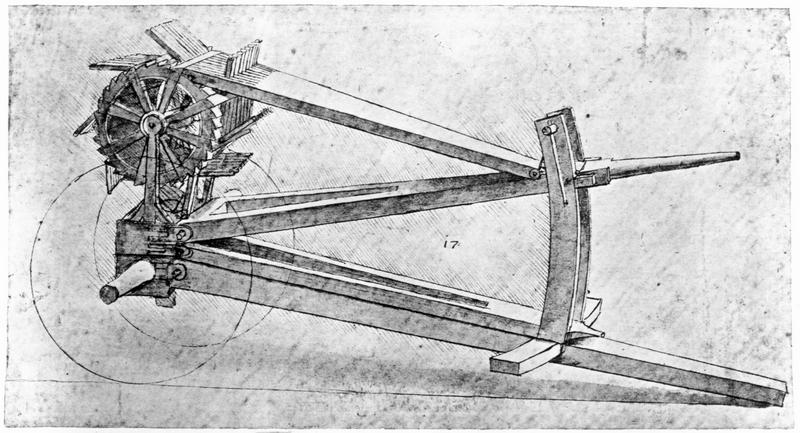Leonardo Da Vinci's Incredible Inventions
By | October 23, 2019

Leonardo da Vinci (1452-1519), is the penultimate “Renaissance Man.” Known best for his paintings of The Last Supper and the Mona Lisa, Leonardo’s interests spread far beyond the arts and into engineering and science.

Leonardo da Vinci was born near Florence in 1452. He was apprenticed to the famous artist, Andrea del Verrocchio of Florence. At age 25, he left his apprenticeship for individual commissions until he became the court artist for the Duke of Milan at age 30. Despite being anti-war, he designed military weapons or at least proposed designs for them. Later, he worked in various cities in Italy including Rome, Bologna, and Venice. As mentioned, he is most renowned for his art, but Leonardo kept extensive notebooks which chronicled among other things, proposed inventions mainly for military use. From gliders to submarines, Leonardo’s far-reaching vision encompasses land, air, and sea which were brought to life by sketches he made in his private notebook.
This article will look at eight of his more curious inventions. Most were never made in his time, but almost all foreshadowed machines invented in later centuries.

Diving Suit
While in Venice in 1500, Leonardo was hired to design military equipment for the city. Leonardo conceived a diving suit that allowed men to swim up to an enemy ship and then sabotage the hull. Leonardo’s diving suit was made of leather, complete with a face mask. Air was provided to the diver through cane tubes reinforced by metal against sea pressure attached to a bell-shaped cork buoy at the surface. To descend or ascend in the water, a diver could use a balloon. It even included a urination bottle — just in case. Leonardo also toyed with storing air underwater in wineskins, predating SCUBA by over four centuries.
The diving suit was never built, although similar kinds of diving dress were invented in the early 18th century.

Ornithopter
Leonardo first considered the idea of powered flight as a means of military reconnaissance. He was captivated by the idea and envisioned a means for humans to attain flight centuries before the Wright Brothers. He drew over 500 sketches related to flight which included ornithopters, machines that take flight by means of flapping wings. While these designs do not work, it is telling of how influenced Leonardo was in his design by nature.

Aerial Screw
Another powered flight design was the Aerial Screw, or “air screw” in which a man would power a device to compress air and give lift. It is thought that he was inspired by the whirling motion of maple tree seeds. Unfortunately, Leonardo’s invention could not work since humans cannot generate enough power to give the machine lift. Leonardo’s designs inspired Igor Sikorsky’s designs of modern helicopters.

Parachute
It just makes sense that if Leonardo designed flying machines, he should also design a means to get safely back to the ground if something fails. Hence he designed a parachute in 1485.
Leonardo’s linen parachute was shaped like a pyramid and framed with wood. Unlike modern parachutes, Leonardo was not stowed in a container and opened with a ripcord. It is likely that Leonardo designed his parachute based on the models of Taccola and Francesco di Giorgio.
The Leonardo parachute was tested by skydiver Adrian Nichols in 2000. He found that it gave a smoother ride than a regular parachute. The problem, however, was that a person was likely to get injured by the heavy, 200-pound wooden frame upon landing.

Armored Fighting Vehicle
Another invention that Leonardo proposed was an armored fighting vehicle that is best described as the forerunner to the tank. Inspired by a turtle, the machine had a conical top covered with sheets of protective wood reinforced by metal plates with an aperture at the top for ventilation. Around the tank were loopholes. The vehicle could move and shoot in any direction being powered by a gear system cranked by four men. Because of the slanted angle of the armor, it is in some ways superior to the early World War I era tanks.
Leonardo sold the idea to the Duke of Milan writing to him: “I can make armored cars, safe and unassailable, which will enter the closed ranks of the enemy with their artillery, and no company of soldiers is so great that it will not break through them. And behind these our infantry will be able to follow quite unharmed and without any opposition.”
Modern analysis of the fighting vehicle shows that the gear system that Leonardo designed does not work because of a simple flaw in the gear system. Some scholars contend that Leonardo did this on purpose due to his moral opposition to war.

Giant Crossbow
Leonardo also proposed a design for a gargantuan ballista, essentially a huge crossbow used for siege warfare. Crossbows were common in Leonardo’s day and are much more accurate and deadly than bows and arrows. His ballista, which was approximately 86 feet long was meant to strike fear into the heart of an enemy. Like his other designs, this machine was never made.

Machine Gun
Cannons were slow to load in Leonardo’s time. He, therefore, invented a 33 barrel gun carriage that rotated which allowed for staggered reloading in groups of eleven. It was a harbinger of the modern machine gun. The design has been tested on the Discovery Channel, and the results seem to be devastating.

Robot Knight
Last is the most curious of Leonardo’s inventions — the robot or mechanical knight. Rediscovered in his notebooks in the 1950s, this Autonoma, which apparently was built, was clad in medieval armor was capable of making human-like motions through a system of gears and levers. Although the actual machine is now lost, it could apparently sit, move its jaw, and walk — incredible considering the technology of the time period. It is probably through Leonardo’s study of the human anatomy that allowed him to create such a groundbreaking machine.

